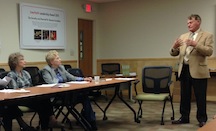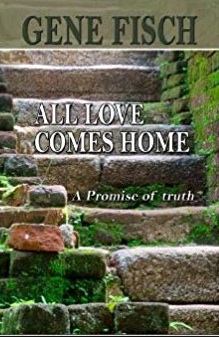Members of WTB and their guests assembled eager to hear the inspiring story of a family that stood up for truth during the horrors inflicted in the 1930s and 1940s on Poland.
Local author Gene Fisch is a Polish immigrant, his family survived horrific conditions under Soviet and Nazi occupations of Poland during World War II. After moving to America, he was raised in Syracuse, excelling academically and athletically at Sacred Heart School. He went on to great success in many fields: athletics (NYU basketball), business (Fortune 500 companies), and public service (national advisor to President Nixon and First Consumer Affairs Director for the City of Syracuse).
His novel All Love Comes Home: A Promise of Truth, the first part of a historical trilogy, is a tribute to his family’s “spiritual endurance to prevail” during the worst times of the 20th century by “the power of human will” and faith in family, God and country. Book Two is about his family’s survival under the Nazis; Book Three is about his own life and career.
Mr. Fisch was interviewed on Good News America, an internet blog promoting peace among friends and foe, and this interview was featured at the UN International Day of Peace.

Mr. Fisch began saying his story is formed by the character, integrity and resourcefulness of his parents who struggled to uphold the ideals of “the free mind and soul” through times of unimaginable anguish and in the twin faces of evil: Communist USSR and Nazi Germany. His mom in particular was an extraordinary woman committed to ideals higher than herself.
The trilogy he has written uses his family as a backdrop to explore the truth of what happened to the people of Poland and the Eastern Borderlands of Russia as the area was divided between the Stalin’s USSR and Hitler’s Germany. Mr. Fisch spoke of the historical context and events of the period, the character and faith demonstrated by his own family, and his fervent belief that understanding the truth of history can guide our foreign policy today.
Mr. Fisch detailed Poland’s history from 1919-39, a time of constant strife in Europe. Poland was a diverse nation; its 1791 Constitution, the first constitution in Europe, guaranteed freedom and equality to all citizens, including Jews. While we often think of Poland as succumbing easily to military aggression, this is not true. After Lenin consolidated power in 1919, the USSR invaded Poland intending to go all the way to Germany. From 1919 to 1921 Poland fought and won a war against the Soviets, gaining parts of Lithuania, Estonia and western Ukraine. Then Poland existed between the two totalitarian evils of Nazism and Communism, its land the site of much “monstrous evil.”
In 1939 Hitler and Stalin signed a pact and divided Poland between them. Hitler attacked Poland September 1, 1939 beginning World War II; the Soviet Union invaded on September 17. In the month it tried to resist the invading forces, Poland suffered 600,000 military deaths. Under the Soviet occupation, millions of Polish and borderland citizens were forced into Siberian gulags, labor camps where the life expectancy was 180 days. Many were massacred by the Soviet KGB or deported; many died from disease, starvation, exhaustion, or freezing to death. Soviet genocidal practices began in Poland and the borderlands during the 1930s prior to World War II.
All Poles were targeted, not just those of Jewish heritage. Twenty two million Slavic Christians and 6 million Jews were murdered from1939 to 1946.
Gene’s parents embodied the best of Polish character and Catholic faith. His mom, a “born adventurer,” child of a privileged family, became the first female to teach in a seminary. There she fell in love with his dad, a student who (abandoned by his family as a young child) had been adopted by a Franciscan. His mom moved to impoverished Eastern Poland, where she set up a network of 30 schools. His dad, a craftsman, later joined her. During this time of Stalin’s purges, massacres in the Ukraine were bleeding into Poland and Lithuania, and fear was being systematically created. In August 1939, as part of an attempt to instigate a Polish Communist revolution, KGB agents disguised as civilians came in and executed the elite of Poland.
His mom had a choice: stay or leave. Not only did she choose to stay, she went to Moscow and wrote essays about what was going on in Poland so the world would know. The New York Times was not reporting what was happening; instead, the USSR was being reported as a “utopian” society. His mom chose to go “into the fire.” She organized a system of trading/barter centers in the forest to preserve Polish culture and prevent deaths by starvation. All this happened prior to the Nazi blitzkrieg and Soviet invasions of 1939 that began World War II.
Mr. Fisch’s family survived five occupations: Soviet/Nazi occupation of Eastern Poland (Sept 1943-1944); German occupation; Ukraine’s occupation (1934-44); German occupation in Western Germany in concentration camps; and English occupation after liberation (1945-49). Gene was born during the German occupation. His mom delivered him in a field and was his sole source of nutrition until he was two years old. He had two older sisters and a brother. The family was arrested by the Germans, put in a labor camp and used as “human shields,” riding on the front of trains to deter attacks. His family went all over Europe on trains delivering supplies, passing thousands of labor camps, cramped in box cars filled with the smells of fear and death. They were starving and suffering so much that at one point Gene’s dad told a German officer, “The most moral thing you could do is kill us.” The officer thought about it, agreed, and started shooting the human shields, but the officer’s gun jammed as he took aim at his father.
The family ended up at the Breslow labor camp in Cologne, Germany, an underground camp where his mom worked in a cannery and his dad in a chemical facility. From May 1944 to April 1945 he only saw his parents once a week. Cologne was carpet bombed by the Allies leaving only the Cathedral standing amid the burned buildings. When the English were about to cross the Rhine and liberate the area, Gene’s family was so desperate that they crawled into a German bunker looking for food. The German soldiers actually fed them. One hour after his family left the bunker, it was blown up. Through the incredible suffering they endured, Gene’s family relied on strength of character and unwavering commitment to their higher ideals of faith and family.
Mr. Fisch believes it is very important for us to understand what evil is. The number of innocent people killed by the Soviets during the peace time occupation has not been widely publicized and is barely mentioned (let alone unconditionally condemned) in historical accounts of the period. He sees parallels between the actions of the Soviet Communists prior to World War II and current situations in Ukraine and the Middle East. Gene believes that knowledge of the events his family lived through should inform our response to the threats brought by terrorism (ISIS, for example), Putin’s aggression and atrocities against Christians in the Middle East. Further details of Gene’s story are available at www.genefischstory.com.
A short question-and-answer period fostered a provocative and interesting discussion. Mr. Fisch is against all forms of socialism because his core belief is freedom of the mind and soul. All forms of socialism try to address inequality of income, which he sees as keeping people from rising according to their attitude and skill. He was asked to define his concept of evil. “Evil” can be extended to so many human acts and judged in so many ways, but it always results in a harm to someone. “To see it and not act against it is most certainly evil.”
He sees honor, integrity and patriotism as higher ideals and believes a nation can be involved in a “just war.” In response, some objected that an act like the bombing of Hiroshima could not be justified merely because a nation felt it was done in the service of a moral cause.

